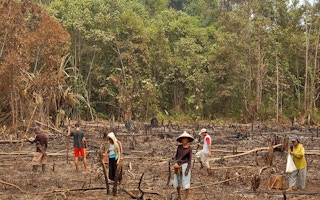The father of a little girl who died during Indonesia’s 2015 fire and haze crisis testified on Thursday as part of a legal challenge to the police’s closing of cases against 15 companies alleged to be complicit in the burning.
The man, Mukhlis, recalled how his daughter had had to be treated with oxygen therapy and then a defibrillator after a mild cough worsened to the point where she was hacking up a yellowish-black liquid. Muhanum Anggriawati passed away in the hospital after a week on a breathing machine, her lungs full of mucus.
Mukhlis said he hoped the 15 cases would be reopened. Another parent whose child had died agreed. “Hopefully this smoke won’t take any more victims,” Erry Wiria told the court.
The aggrieved parents hail from Riau, a province on Indonesia’s main western island of Sumatra and an epicenter of the agricultural fires that each year blanket Indonesia and its neigbors in toxic smoke. The fires are a result of slash-and-burn practices by farmers and companies looking to clear land cheaply. An underlying cause is that Indonesia’s vast peat-swamp zones have been widely drained for agriculture; the dried peat is highly flammable.
“
Hopefull the smoke won’t take any more victims.
Erry Wiria, resident, Riau province, Indonesia
Last year’s fires were particularly devastating due to an extended dry season brought on by El Niño. They burned an area the size of Vermont, sickened half a milliion people and released more carbon than the entire U.S. economy during the same period.
President Joko “Jokowi” Widodo has called for an end to the lax law enforcement that has characterised past haze oubreaks. But the news out of Riau in July that the police had quietly released SP3 notices related to 15 firms the environment ministry had listed in connection with the burning prompted outrage nationally. A SP3 is an official police document that confirms a case has been closed.
Mukhlis and Erry Wiria testified as part of a citizen’s lawsuit brought by the people of Riau and an advocacy team of 10 lawyers against the Riau Police and the National Police. They allege that the SP3 notices were illegally issued and demand that the cases be reopened.
In addition, national NGO the Indonesian Forum for the Environment (Walhi) has also filed a legal challenge in Riau, but is currently focusing on just one of the SP3s — that pertaining to PT Sumatera Riang Lestari, a supplier to pulp and paper giant APRIL — rather than all 15. “Based on the evidence, that case has the most complete dossier,” a lawyer for the plaintiffs told local media.
Lawmakers in Jakarta have also set up a commission to investigate the controversy over the SP3s.
Since the beginning of the year, Riau has had three police chiefs — first Dolly Bambang Hermawan, then Supriyanto and now Zulkarnain Adinegara — at least two of whom have been summoned to testify by the commission. Each one has denied responsibility for issuing the SP3s, which only came to light after NGOs approached the police about the cases.
Doctors who treated Mukhlis’ daughter said they couldn’t be certain whether her death was a result of the toxic smoke. It was the same story with Wiria’s son, Ramadhani Lutfi Aerli. But Wiria said an x-ray had revealed an agglomeration in Ramadhani’s lungs that doctors had described as a “white cloud.” Both parents believe the haze killed their children.
Little is known about the precise health effects of prolonged exposure to the unique blend of chemicals emitted by Indonesia’s burning peatlands, but a recent study by Harvard and Columbia University researchers estimated a mean of more than 100,000 premature deaths resulting from last year’s crisis. The Indonesian government has officially counted 24 deaths and rejects the universities’ findings.
The judge offered her condolences. “We have all become victims,” she said.
This story was published with permission from Mongabay.com










